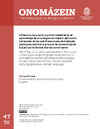Please use this identifier to cite or link to this item:
https://accedacris.ulpgc.es/jspui/handle/10553/72830
| Title: | Influencia de la cultura y de la identidad en el aprendizaje de una lengua extranjera: aplicación del modelo de las seis dimensiones de Hofstede (2010) para analizar el proceso de aprendizaje de ELE por parte de estudiantes surcoreanos | Other Titles: | The influence of culture and identity in the process of learning a foreign language: an application of Hofstede’s six-dimension model (2010) to analyze the learning process of South-Korean students studying Spanish as a foreign language | Authors: | Clouet, Richard | UNESCO Clasification: | 570111 Enseñanza de lenguas | Keywords: | Dimensiones culturales Español como lengua extranjera (ELE) España Corea del Sur Cultural dimensions, et al |
Issue Date: | 2020 | Journal: | Onomazein | Abstract: | El propósito de este trabajo es tratar los aspectos culturales diferenciadores entre España y
Corea del Sur según el Modelo de las seis dimensiones elaborado por Geert Hofstede (2010).
Estas dimensiones culturales se aplicaron al proceso de aprendizaje de ELE de estudiantes
coreanos en España, con el objetivo principal de realizar un análisis de caso para entender
mejor las necesidades de estos estudiantes en el aula de ELE.
En esta investigación ofrecemos un estudio de carácter cuantitativo basado en cuestionarios
a veinte estudiantes coreanos. A través de sus resultados pretendemos ofrecer luz
acerca de las causas sobre las que descansa la reticencia a hablar de los estudiantes coreanos
en el aula universitaria de español como lengua extranjera, su falta de autonomía y su inusual
dependencia de actividades de memorización, entre otros aspectos. This article deals with the cultural aspects that differentiate Spain and South Korea following Geert Hofstede’s model of six cultural dimensions (2010). These cultural dimensions were applied to the learning process of Spanish as a foreign language (SFL) by a group of Korean students in Spain, this work being based on a case analysis in order to better understand the needs of SFL students. This research is based on the study of quantitative data collected in surveys handed out to twenty Korean students. The results are aimed at shedding light on the causes that explain the reticence of students when it comes to interacting in the Spanish language classroom, their lack of autonomy and their unusual dependence on memorization activities, among other things. |
URI: | https://accedacris.ulpgc.es/handle/10553/72830 | ISSN: | 0717-1285 | DOI: | 10.7764/ONOMAZEIN.47.03 | Source: | Onomazein [ISSN 0717-1285], n. 47, p. 46-79, (Marzo 2020) | URL: | http://dialnet.unirioja.es/servlet/articulo?codigo=7345248 |
| Appears in Collections: | Artículos |
WEB OF SCIENCETM
Citations
1
checked on Jan 25, 2026
Page view(s)
134
checked on Jan 10, 2026
Download(s)
191
checked on Jan 10, 2026
Google ScholarTM
Check
Altmetric
Share
Export metadata
Items in accedaCRIS are protected by copyright, with all rights reserved, unless otherwise indicated.
